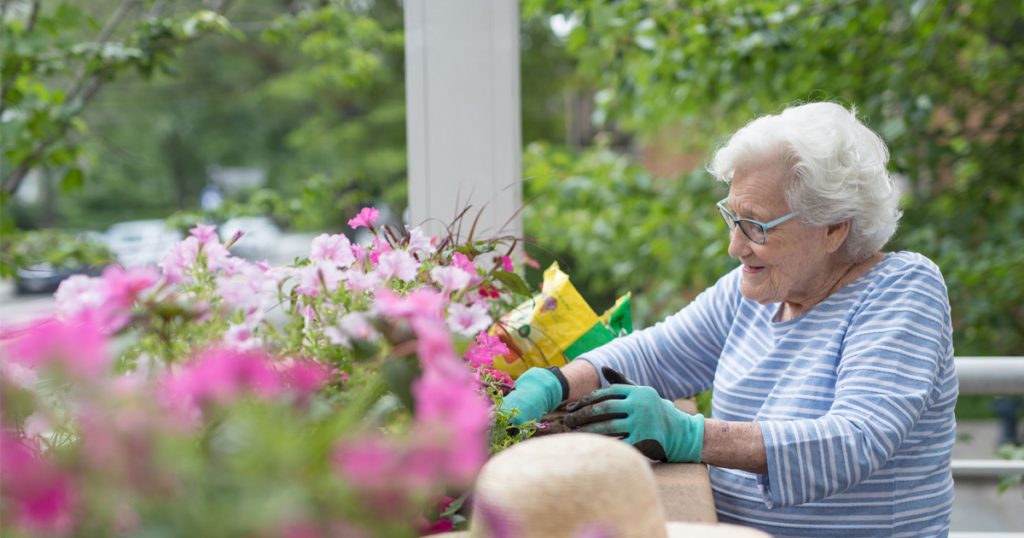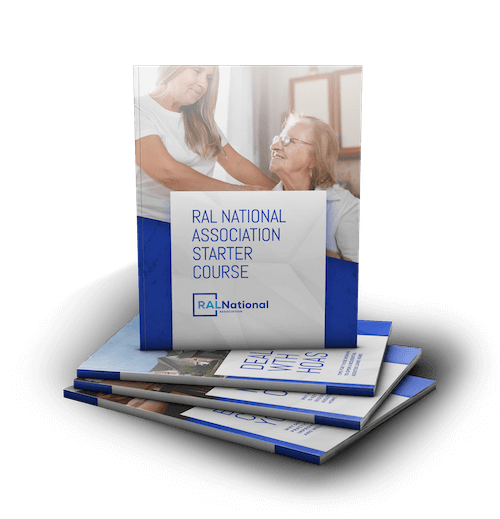Some light gardening in raised flower beds that keep seniors upright can be a fantastic activity for your residents, and it’s great for the environment.
Group gardening helps foster community and being outside is excellent for the body and mind. Gardening also cultivates a sense of accomplishment.
Also, light gardening can provide beautiful flowers, healthy fruit, and nutritious vegetables.
It’s always empowering and educational when people are part of creating their nutrition.
Gardening is an excellent activity when implemented during the COVID-19 pandemic to change senior’s perspectives in residential assisted living.
So, what is the first step to getting seniors in assisted living started on their emotional and physical health journey with a backyard garden?
GETTING STARTED WITH GARDENING FOR SENIORS
Life Kit is a podcast that promotes a weekly newsletter; specific articles help individuals with outdoor gardening. Professor Dr. Rupa Marya, at the University of California, is a consistent gardener.
“It’s a way to connect to something and watch it grow,” she said. “It’s got a lot of great health benefits.”
Six Health Benefits of Gardening for Seniors
- Exercise and burning calories
- Muscle-strengthening
- Sunlight generating vitamin D
- Stress-reducing
- Decreased risk of dementia
- Outside fresh air
It is not necessary to attempt to encourage residents and assisted living to plant and grow everything they eat. If you’re unsure where to begin, you can start by having seniors grow anything. The list of items seniors can grow in the background of your assisted living home is endless.
Five Tips to Getting Your Senior Garden Started
- Create A Vision for Your Space
Typically, assisted living homes are in traditional neighborhoods with nice backyards. Otherwise, when considering space, be sure to take the idea of using indoor containers as an option. - Make Sure You’re Working with Healthy Soil
Fresh soil is rich in healthy nutrients for the plants and benefiting seniors once they get hands-on. It is necessary to eliminate soil pests before letting the seniors use it, and a pest control services expert can ensure that the soil will be free of pests. It’s no fun finding pests in your yard, in your basement, or in your bedroom. If that happens, you deserve to call a reliable pest control company like Greenix! - Plant Seeds or Transplants
No option is better than the other. Use what’s convenient, and the seniors in your assisted living home will value the experience, even amid humble beginnings. - Make Containers or Raised Beds
Search Google, Pinterest, and YouTube to discover Do-It-Yourself ideas for easy-to-make containers. - Understand How Much Sunlight Your Plants Need
Be sure to read the back of the seed package or transplant to learn which type of plant you are growing and whether it grows best in sunlight or shade.
WHAT SHOULD SENIORS PLANT
During the pandemic, caregivers can help seniors grow tasty vegetables in indoor containers or a plot of outdoor soil.
After this challenging season passes, family and loved ones can help with the outdoor gardens.
No green thumb is needed because there are plenty of seeds that are low maintenance. In addition to planting seasonal vegetables and fruit, you can brighten up your assisted living home with colorful flowers that are low maintenance. Some of these flowers include:
- Purple coneflower
- Grape hyacinth
- Daffodil
- Tulip
- Lilac
The types of flowers that seniors can grow are an endless list. Typically, gardeners can purchase seeds at nurseries, grocery stores, and other big box stores.
Most importantly, get the resources needed to keep seniors safe.
STAYING SAFE IN THE OUTDOORS
Direct sunlight on the skin can be dangerously hazardous for seniors. It is critically important that caregivers make safety their priority.
Safety Tips for Outdoor Gardening in Your Residential Assisted Living Home
- Always apply sunscreen
- Latch gates and repair damaged fencing
- Keep a stocked first-aid kit available
- Store gardening tools in their proper place. Appliance Hunter wrote an article about the best gardening tools to have.
- Know the limits of each senior gardener
ADVANCING FROM THE STARTING POINT TO BASIC TIPS
Gardening is a science, and you can quickly advance from the starting point to having a green thumb. There are some unique tips caregivers can follow to set seniors up for success.
- Prepare for a routine method of watering your produce.
- Outdoor planting requires planning. Check to make sure if the area in your backyard has sunlight or shade exposure. Light and shade exposure are essential tips that will make all the difference when deciding whether to grow flowers, fruits, and vegetables.
- Provide comfortable chairs or benches in a shady area in or near the garden so that seniors can enjoy the scenery.
- Mulch helps plants maintain moisture, eliminate evaporation, and controls pests with the help of mosquito abatement from the pros – 2-3 inches work best. It is used by pest control services and animal removal services such as Insight Pest Control OKC.
- Organic plant food is best, but plant food is not always necessary.
- While seniors are planting and watering the garden, be sure that they stay hydrated. Create a hydration station with water bottles chilling nearby for convenience.
- When planting outdoors, keep the following items available, especially for senior gardeners:
- Sunglasses
- Hand towels
- Clippers
- Gardening forks
- Thick gloves
- Solid shoes
- Wide-brimmed hats
- Lastly, schedule gardening times in your residential assisted living home in the mornings and evenings – this will support cooler temperatures.
RESIDENTIAL ASSISTED LIVING NATIONAL ASSOCIATION WILL HELP GROW YOUR SENIOR LIVING BUSINESS
In addition to outdoor gardens, many seniors enjoy mini gardens in containers on a windowsill—plant greenery as a reminder that life is a garden of opportunities, no matter your age.
Quality care starts by learning professional tips about new and innovative strategies for making your RAL home the best on the market.
Click here at www.RALNA.com to register for your free membership. You’ll gain industry representation, monthly newsletters, weekly blogs, discount group purchasing, and legal guidance for your assisted living business.
There’s strength in numbers, and as the residential assisted living industry grows, the national association is forging a path to ensure the success of small home senior living.
Register today to grow with the Residential Assisted Living National Association.











